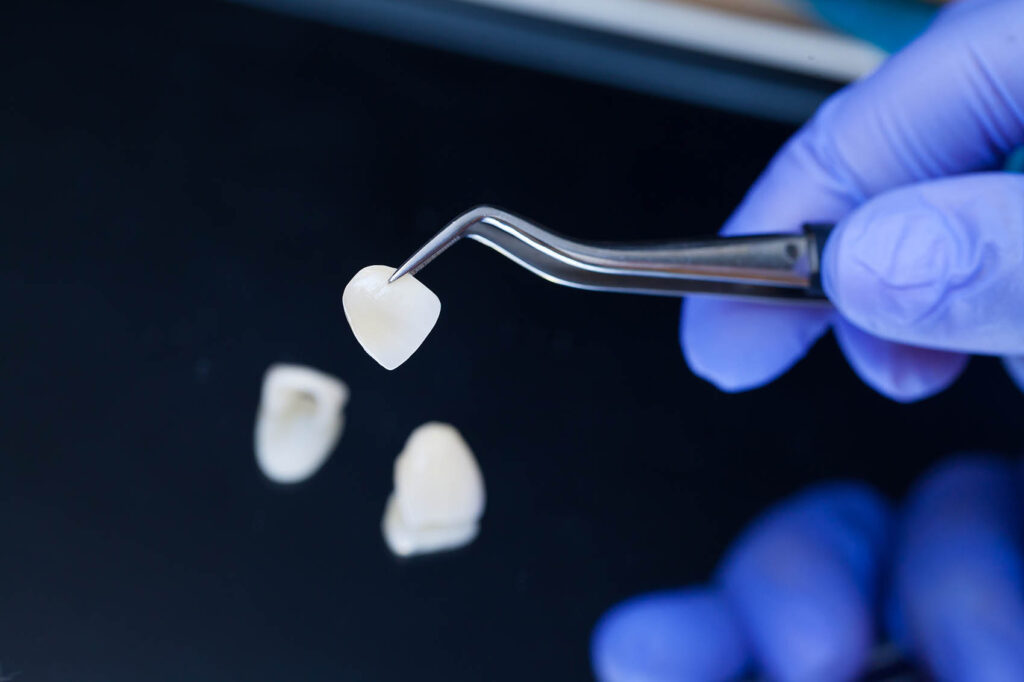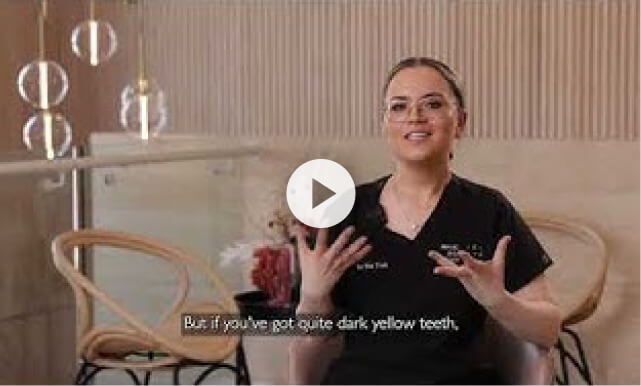Veneers have become a popular go-to solution for those on the hunt for a picture-perfect smile. These wafer-thin shells are typically made out of porcelain or composite resin, and then expertly fixed to the front of your teeth, providing an instant aesthetic upgrade. From discolouration and chips to gaps and misalignment, veneers are the path back to a winning smile.
However, just as with your natural teeth, veneers don’t maintain themselves. They care and pay attention to keep them gleaming for years to come. You might find yourself asking, “Do I need to brush veneers?” The answer is an unequivocal yes. Not only is brushing your veneers essential to ensure they last, but it’s also key to the health of your underlying natural teeth and gums.
We’ll cover everything from brushing techniques and choosing the right toothbrush, to selecting the appropriate toothpaste and understanding the role of flossing and mouthwash.
For more information on veneers, including images, visit our Veneers Before and After page.
The Importance of Oral Hygiene with Veneers
Maintaining good oral hygiene is essential, but with porcelain veneers it’s even more important. While resistant to staining, veneers can get damaged or even discolour over time without proper care.
Veneers can go over existing teeth, which means the health of your natural teeth directly impacts the longevity and appearance of your veneers. If the tooth or gum around a veneer becomes unhealthy, it can affect the veneer’s fit and appearance.
While the veneer itself can’t decay, the tooth underneath it can. Poor oral hygiene can lead to you needing to replace the veneer altogether down the track. However, it’s important to note that with proper oral care, the chances of this occurring are very slim.
Brushing and flossing regularly helps to remove plaque and prevent tartar build-up. Using a non-abrasive toothpaste and a soft-bristled toothbrush can help to keep your veneers clean without causing damage. In addition to brushing and flossing, regular dental check-ups are important. Your dentist can monitor the health of your teeth and gums, as well as the condition of your veneers, ensuring any potential issues are caught early.
How Do You Brush Your Teeth with Veneers?
Brushing your teeth with veneers isn’t that different from brushing your natural teeth, but there are a few key things to keep in mind to ensure you’re caring for your veneers properly.
Brushing Techniques for Veneers
When it comes to brushing veneers, technique matters. The right brushing technique can help keep your veneers in top-notch condition, while also promoting overall oral health. Here are some tips to guide you:
- Use the right toothbrush: Opt for a toothbrush with soft bristles. Electric toothbrushes can also be a good option.
- Apply gentle motion: Brush using gentle, circular motions rather than rough back-and-forth strokes.
- Start from the gum line: Start from the gum line and work your way down on each tooth.
- Don’t forget the inner surfaces: Many people focus on the front surfaces of their teeth, but it’s equally important to clean the inner surfaces (the side of your teeth facing your tongue).
- Brush for two minutes: Dentists recommend brushing for at least two minutes to ensure all areas of your mouth are thoroughly cleaned.
- Rinse thoroughly: After brushing, rinse your mouth thoroughly with water to remove any toothpaste or debris left behind.
Finally, don’t forget to brush at least twice a day, just as you would with your natural teeth. Regular brushing helps to prevent plaque build-up and keeps your veneers looking their best.
Selecting the Right Toothbrush for Veneers
Here are some factors to consider when selecting a toothbrush for veneers:
- Soft bristles: The bristles of your toothbrush should be soft. Hard or even medium bristles can potentially scratch the surface of your veneers over time, leading to a dull appearance. Soft bristles can effectively clean your teeth and veneers without causing any damage.
- Non-abrasive: Ensure that the toothbrush you choose is non-abrasive. Abrasive toothbrushes can wear down the polish on your veneers, causing them to lose their shine.
- Electric vs manual: Both electric and manual toothbrushes can be used with veneers. Electric toothbrushes often have built-in timers and pressure sensors, which can be helpful in ensuring you brush for the right amount of time and with the correct amount of pressure.
- Replace regularly: Regardless of the type of toothbrush you choose, remember to replace it every three to four months, or sooner if the bristles become frayed.
Choosing the Right Toothpaste for Veneers
Here are some guidelines to help you make the right choice:
- Avoid abrasive ingredients: Some toothpastes contain abrasive ingredients designed to remove stains from natural teeth. However, these ingredients can scratch the surface of your veneers, causing them to lose their shine over time.
- Gel vs paste: Both gel and paste toothpastes can be used with veneers. The choice often comes down to personal preference.
- Sensitive toothpaste: If you have sensitive teeth, using a toothpaste can be beneficial. These toothpastes are typically less abrasive and can help to reduce sensitivity.
Proper Brushing Frequency for Veneers
Maintaining a regular brushing routine is essential for the health of both your veneers and your natural teeth.
- Brush at least twice a day: This helps to remove plaque and prevent the build-up of tartar, both of which can lead to gum disease and tooth decay.
- Don’t forget to floss: This is especially important for people with veneers, as plaque build-up can lead to gum disease, which can affect the appearance and longevity of your veneers.
- Regular dental check-ups: In addition to your at-home oral hygiene routine, regular dental check-ups are crucial for maintaining the health of your veneers.
Flossing and Veneer Care
While brushing cleans the surface of your teeth, flossing removes food and plaque from between your teeth and along the gum line, areas that your toothbrush can’t reach. Here’s some tips:
- Floss daily: Just as with natural teeth, you should aim to floss your veneers at least once a day.
- Use the right technique: Slide the floss up and down along the side of each tooth, making sure to go beneath the gum line. Avoid snapping the floss down onto your gums or dragging it harshly along your veneers.
- Don’t neglect your natural teeth: While it’s important to take care of your veneers, don’t forget about your natural teeth. Even if only some of your teeth are veneered, you should still floss all of your teeth daily.
Mouthwash and Veneer Maintenance
Here’s what you need to know:
- Choose alcohol-free mouthwash: Some mouthwashes contain alcohol, which can cause dry mouth and potentially lead to an increase in cavities.
- Use mouthwash daily: For optimal oral hygiene, use mouthwash at least once a day. It’s often most effective to use mouthwash after brushing and flossing, as it can help to rinse away any remaining debris and leave your mouth feeling fresh and clean.
- Don’t use mouthwash as a substitute: While mouthwash can be a helpful addition to your oral hygiene routine, it should not be used as a substitute for brushing and flossing.
Additional Tips for Maintaining Veneer Oral Hygiene
While brushing, flossing, and using mouthwash are the cornerstones of maintaining oral hygiene with veneers, there are a few additional tips that can help keep your veneers in top condition:
- Avoid hard foods: While veneers are durable, they are not as strong as natural teeth. Avoid biting into hard foods like ice or nuts with your veneers.
- Limit staining foods and drinks: While veneers are resistant to staining, they can become discoloured over time with exposure to certain foods and drinks. Limit your consumption of coffee, tea, red wine, and other staining substances to keep your veneers looking their best.
- Don’t use your teeth as tools: Using your teeth to open packages or cut tape can damage both natural teeth and veneers.
- Wear a mouthguard: If you play contact sports or grind your teeth at night, wearing a mouthguard can help protect your veneers from damage.
- Quit smoking: Smoking can stain veneers and natural teeth. If you’re a smoker, quitting can improve the appearance and health of your teeth and gums.
Book a Veneers Consult
If you’re considering veneers or if you already have them and want to ensure you’re taking the best possible care of them, book a veneers consultation with the team at Dental and Skin Clinic.
Our experienced dental team will assess your oral health, discuss your aesthetic goals, and provide personalised advice on whether veneers are the right choice for you. If you already have veneers, we can check their condition and provide tailored advice on how to maintain them.
Don’t leave your smile to chance. Book a veneer consultation today and take the first step towards a brighter, healthier smile.



